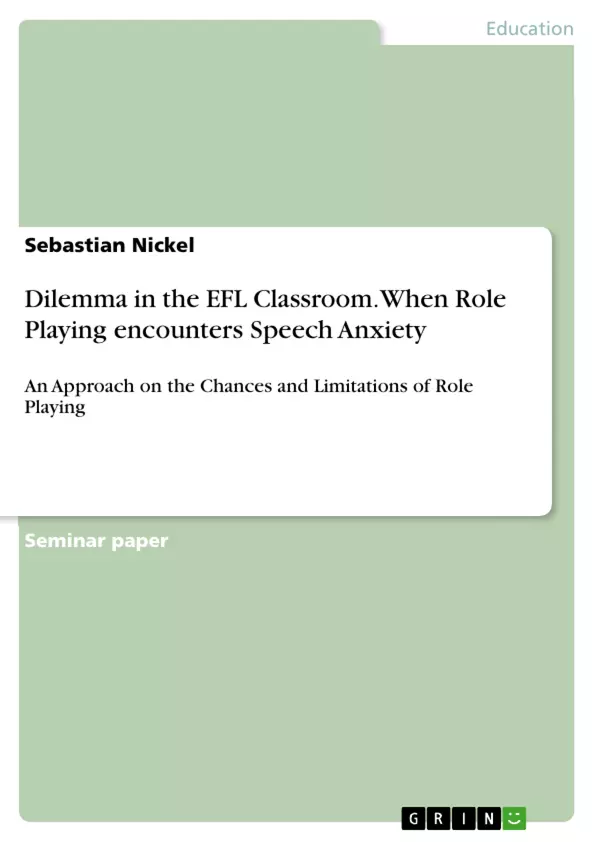With the turn to rather communicative language teaching during the mid-seventies, role playing has found its way in German EFL classrooms. Even forty years after its initial arrival, role playing is still one of the most frequently used communicative teaching methods. The method is commonly regarded as decidedly effective, communicative, versatile and close to everyday life situations. Unsurprisingly, role playing has been also establishing itself in the compulsory Brandenburg curriculum framework for decades now.
However, the apparent opinion of the enormous popularity of role playing is not shared by everybody. Especially for reticent and shy pupils as well as for those who suffer from language and speech anxiety in the EFL classroom, this method states a frequent confrontation with their problems. Since this confrontation can by far not be treated as an individual case, this paper aims to approach on the chances and limitations of role playing in regard to the issue of pupils’ anxiety of speaking. Where in the design of the role play can major issues be found? Are those issues even avoidable? And do comparable alternatives to role playing exist?
In order to provide a proper answer to the raised questions above, the outline of this paper is structured as follows. At first, necessary terminologies need to be defined more closely to ensure the further intelligibility. This part includes a short definition of a role play, its decisive characteristics as well as the explanation of its didactic usage. Furthermore, the terms speech-, speaking- and language anxiety will be examined in the same chapter (2.1 & 2.2). Following this, leading scientific theories around anxiety in the language classroom (2.3), including Horwitz’s components of language anxiety, will serve as a basis to expose the narrow connection between the method’s design and the theories’ perceptions. Against this theoretical background, the third chapter (3.) will focus on the availability of suitable alternatives to role playing and their evaluation. Finally, chapter 4 will conclude and critically reflect on the made perceptions. The personal additional value of this work lays in a more sensitive practice with role plays and in finding improvements within the dealing with speech anxiety of pupils.
Inhaltsverzeichnis (Table of Contents)
- Introduction
- Contextual Analysis
- Definition and decisive characteristics of role plays
- Definition of (speech) anxiety in the EFL classroom
- Speech anxiety and role playing in the EFL classroom
- Critical Reflection
- Alternatives and adaptation of role plays to speech anxiety
- Conclusion
Zielsetzung und Themenschwerpunkte (Objectives and Key Themes)
This paper investigates the challenges and possibilities of using role-playing in EFL classrooms, specifically addressing the issue of pupils' speech anxiety. It examines the potential difficulties presented by this teaching method for reticent or anxious students and explores ways to mitigate these problems.
- Definition and characteristics of role plays
- Speech and language anxiety in the EFL classroom
- The impact of role-playing on speech anxiety
- Alternative teaching methods to address speech anxiety
- Strategies for adapting role-playing to minimize anxiety
Zusammenfassung der Kapitel (Chapter Summaries)
- Introduction: The introduction sets the stage for the paper by highlighting the popularity and effectiveness of role-playing in EFL classrooms while acknowledging the challenges it presents for students experiencing speech anxiety. The paper aims to investigate the potential issues associated with this teaching method and explore solutions.
- Contextual Analysis: This chapter defines and explores the key concepts of role-playing and speech anxiety. It clarifies the various approaches to defining role-playing, emphasizing its communicative and pedagogical aspects. It also examines different definitions of speech and language anxiety, highlighting the distinctions between these concepts.
Schlüsselwörter (Keywords)
This paper focuses on the intersection of role-playing and speech anxiety in the EFL classroom. It examines the definition and characteristics of role-playing, the various forms of speech anxiety, and the potential impact of role-playing on anxious learners. Key terms include: EFL, role-playing, speech anxiety, language anxiety, communicative language teaching, didactic principles, alternatives to role-playing, and strategies for adaptation.
Frequently Asked Questions
Why is role-playing a popular method in EFL classrooms?
Role-playing is considered highly effective and communicative because it simulates everyday life situations, encouraging students to use English in a practical context.
What is the main challenge of role-playing for anxious students?
For students suffering from speech or language anxiety, role-playing presents a direct confrontation with their fear of speaking, which can lead to withdrawal or distress.
What are Horwitz’s components of language anxiety?
The paper uses Horwitz's theories as a basis to explain how specific anxieties (like test anxiety or fear of negative evaluation) manifest in the language classroom.
Are there alternatives to role-playing for students with speech anxiety?
Yes, the document explores suitable alternatives and adaptations of role-plays to make them more accessible and less intimidating for reticent pupils.
How can teachers improve their practice regarding role-plays?
By developing a more sensitive approach and finding ways to minimize performance pressure, teachers can help anxious students participate more effectively.
- Quote paper
- Sebastian Nickel (Author), 2017, Dilemma in the EFL Classroom. When Role Playing encounters Speech Anxiety, Munich, GRIN Verlag, https://www.grin.com/document/444904



